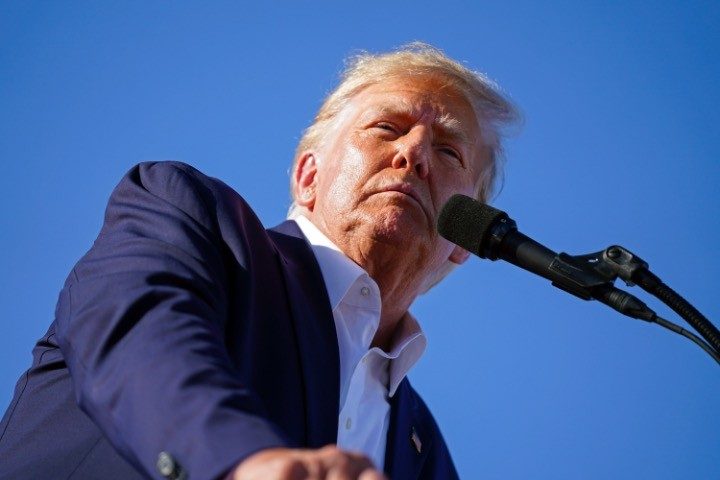
Being a “presidential historian” apparently does not include studying the words of the Founding Fathers.
In a March 31 Time magazine article, several “presidential historians” are asked to offer their opinions on what the Founding Fathers would think of Donald Trump’s indictment.
For those who for some reason haven’t heard, former President Trump was indicted by a grand jury in New York. The crimes he has been indicted for are unknown, however, as the indictment is sealed. For context that will be necessary to understand some of the information in this article, though, readers should know that it is assumed that the charges relate to accusations that Trump used campaign finance funds to pay hush money to Stephanie Clifford (aka Stormy Daniels), with whom he is accused of having had an affair. Again, for clarity, this is an assumption, as the indictment is sealed.
Now, on to the opinions offered by Time magazine’s handpicked historians.
First up is Jack Pitney, professor of politics at Claremont McKenna College. Referencing The Federalist, No. 51, Pitney writes:
The Founders…didn’t anticipate that a president would commit this particular crime, but they were very much aware that bad people could ascend to high office, and that’s why they built an elaborate system of checks and balances between the branches at the federal level. I think if James Madison were to come back today, he would probably be shocked at the underlying activity of Trump, but not at all surprised that a local prosecutor would go after him for falsifying business records.
In fairness, none of that makes any sense, and it in no way has anything to do with The Federalist, No. 51.
Whether the Founders anticipated that a president would commit a certain crime is, like the contents of the Trump indictment, unknown to us. If we’re going to be fair, though, Alexander Hamilton, unquestionably a member of the Founding Fathers varsity squad, admitted to paying money to a lady to keep her from making public their illicit relationship. Alexander Hamilton was never president, but such a situation as the one in which President Trump allegedly finds himself in would not have been something unknown to the Founding Fathers.
Now, Pitney’s reference to the the Constitution’s system of checks and balances has absolutely nothing to do with whether a presidential candidate — the payments allegedly made by Trump to Clifford were made before he was elected president — is accused of committing illegal acts.
I will give Pitney credit for this: The Federalist, No. 51 does deal with the checks and balances created in the Constitution. As for whether that system had anything to do with preventing people who may have committed a crime from running for president, all anyone — including presidential historian Jack Pitney — would have to do is read the very first two sentences of that essay:
To what expedient, then, shall we finally resort, for maintaining in practice the necessary partition of power among the several departments, as laid down in the Constitution? The only answer that can be given is, that as all these exterior provisions are found to be inadequate, the defect must be supplied, by so contriving the interior structure of the government as that its several constituent parts may, by their mutual relations, be the means of keeping each other in their proper places.
With that explanation in mind, it seems that Trump Derangement Syndrome is so prevalent that professors of political science will purposefully wrest the words of James Madison to support their sickness.
Next, as to whether James Madison would be “shocked” at the crimes of which President Trump is accused, I refer the reader to the discussion above of the activities of Alexander Hamilton.
As to whether Madison would “not at all be surprised” that a local prosecutor would “go after [Trump] for falsifying business records,” I can’t imagine that such a situation would have mattered at all to Madison. Madison would, however, if he suddenly returned to the United States, not be surprised that one political party would weaponize the legal system to persecute members of another political party.
In The Federalist, No. 10, James Madison warned:
By a faction, I understand a number of citizens, whether amounting to a majority or a minority of the whole, who are united and actuated by some common impulse of passion, or of interest, adversed to the rights of other citizens, or to the permanent and aggregate interests of the community.
Would any disinterested and intellectually honest person disagree with the assertion that the indictment of Donald Trump by Alvin Bragg is anything less than the act of a person “actuated by [the] impulse of passion or of interest, adversed to the rights of other citizens, or to the permanent and aggregate interests of the community”?
Nothing could be clearer. Bragg’s campaign was in large part funded by George Soros, and he has pursued the prosecution of a former president while “major crimes rose 22 percent in New York City,” as a headline in The New York Times reported earlier this year. It would seem that the “aggregate interests of the community” in New York City would be better served by cracking down on major crimes than in the persecution of a man accused of falsifying business records.
Barbara A. Perry, director of presidential studies at the University of Virginia’s Miller Center, was the next “expert” called upon by Time magazine to misstate the words of the Founders in order to prop up their persecution of President Trump.
I won’t bother breaking down all that Perry wrote, because her opinion echoes that of Pitney in that she also cites The Federalist, No. 51, and the system of checks and balances in support of the thesis that the Founding Fathers would praise the prosecution of Donald Trump.
The last contributor to Time’s article that I’ll comment on is Jeffrey A. Engel, founding director of the Center for Presidential History at Southern Methodist University. Engel’s angle is that Donald Trump would not pass muster with the Founding Fathers because he lacks virtue. Engel writes:
[Trump] is yet again demonstrating that he lacks the essential virtue that the Founders thought was necessary in the President, which was the virtue of virtue—which they defined as someone who was willing to put the public’s good ahead of their own.
Although he doesn’t mention it, Engel seems to be referencing The Federalist, No. 68, Hamilton’s description of the qualities that a man who would be president would possess. Hamilton predicts:
It will not be too strong to say, that there will be a constant probability of seeing the station filled by characters pre-eminent for ability and virtue.
Ability and virtue. I wonder if Mr. Engel would apply that same standard with the same result to the current occupant of the White House.
Finally, as Time’s article began with a question, I’ll end my analysis of that article with a question of my own:
Would any of the “presidential historians” included by Time in their article be willing to publish their opinions as to whether the Founding Fathers would look favorably on the illegal and unethical acts of which Joe Biden — a sitting president — has been accused?



